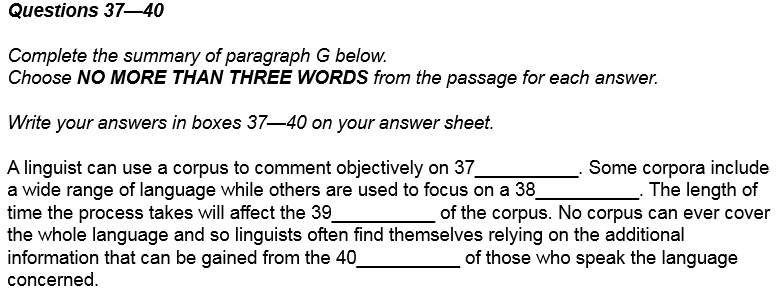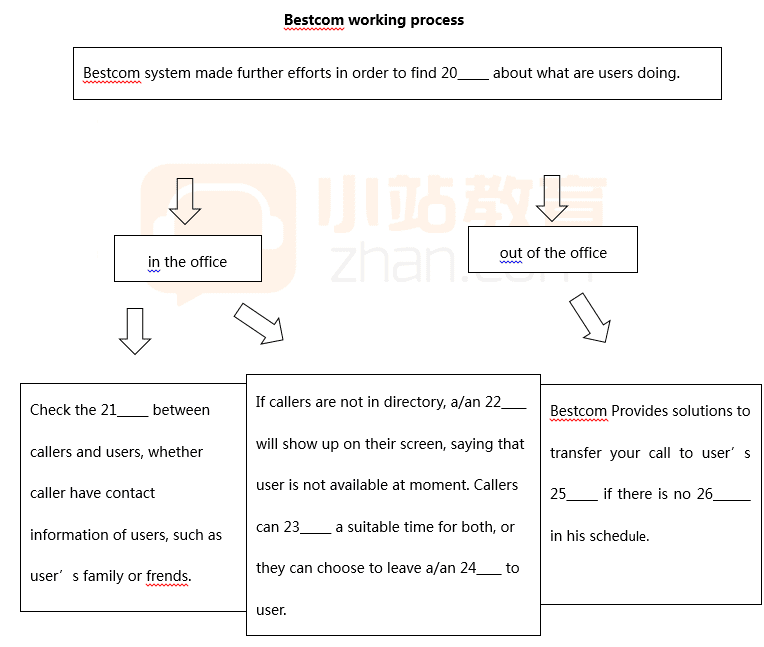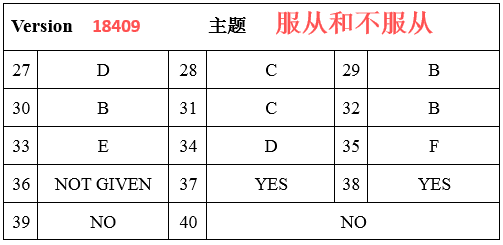阅读在托福四项考察科目里是中国考生相对最容易拿高分的一项。因此如果你想达到一个比较理想的托福分数,首先建议你保证托福阅读得分在你的目标分数范围内。下面小编就和大家分享三步搞定托福阅读,来欣赏一下吧。
三步搞定托福阅读
◆ 第一步:阅读题干与选项,记忆关键词句信息。建议你在正式作答之前先快速浏览题目及选项,对题干和选项中的关键词大体有个印象,这是为了迅速知晓需要找寻什么答案。划关键词这个方法对于其他几个科目的题目分析也非常有用。
◆ 第二步:快速浏览段首(尾)、文首(尾),了解全文思路。时间紧任务重,考场阅读不需精读,而需要考生具有快速阅读的能力。技巧无他,唯有多练。同时,不要陷入“读文章一定要读完”的误区,考场阅读的目的是找到问题的答案。书面英语表达的习惯是重要的观点大多出现在段首、文首(当然也可能是作为总结句或总结段在最末出现),你只要快速浏览这些句、段,就能够理解文章大意与作者观点,并根据第一步划出的关键词来定位答案可能的位置。此处有个窍门是,题目的顺序,尤其是细节题目的顺序,通常和行文顺序是对应的。
◆ 第三步:定位具体位置,精读寻找答案。找到答案可能所在的位置之后,在对应位置进行精读,你就能够找到问题的答案。找到答案后,在作答之余不妨对答案在原文中的位置稍作记录,便于再次检查。
在阅读部分,平均一篇文章对应的答题时间是20分钟。在日常练习时就要注意把握时间,尽量做到能够在55分钟左右高准确率地完成三篇文章的阅读题目,这样比较能够保证在不熟悉的考场环境里也能够稳定发挥。
当然,上述方法的前提是考生已经具备了一些基础英语能力,比如拥有基本的托福词汇水平、能够理解托福水平的英语语法等。这些基础能力其实是听、说、读、写四个科目都需要的。
托福阅读经典练习素材之管理压力的办法
Stress is a huge problem for us all. Here’s what I’ve learned and apply to manage stress using my creativity.
对于我们所有人来说,压力都是个大问题。我在这分享点我自己学到的东西:如何用自己的创造力来管理压力。
1. You don’t have to be a “tortured” artist.
并不是只有“苦难”才能出诗人
It’s easy to use drugs, alcohol, and other crutches to “enhance” our creativity. We’re too disoriented to be thinking about the future, or the past, and we just focus on what’s directly in front of us. We can express ourselves without these crutches.
用药物、酒精或者其他的辅助品通常能很容易地“增强”我们的创造力。因为它们把我们弄迷糊了,让我们看不到未来和过去,只能着眼于当下。(其实只要主动着眼于当下)我们即使不用这些东西也能发挥自己的创造力。
2. Take care of your self. Mind AND Body.
照顾好你自己,心灵与身体都要。
Putting my creativity and my work first, I often neglected to eat, exercise, even stand up from my desk. I spent the whole year in non-stop pain – constant doctors which only caused me to feel depressed, sad and useless. I now realize that how I feel physically (and mentally) is more important than the work I create. Taking care of myself includes all natural remedies such as acupuncture, herbs and vitamins as my only form of medicine. I’m learning how to say no to social pressures, in favor of my own well being.
我曾把创造力和工作放在第一,经常忽视吃饭,锻炼,甚至从桌边站起来。我花了整整一年的时间不停地找医生治疗,而这些只会让我感到沮丧、悲伤和无助。我现在意识到,比起我创作的作品,身心健康更为重要。我照顾自己的方法包括所有的自然疗法,如针灸、草药和维生素(唯一可以算药物的东西)。为了有利于我自己的幸福,我在学习如何对社会压力说“不”。
3. Don’t worry about what other people think of you.
不要担心其他人是怎么看待你的
This is easier said than done, but I promise it does come with age. No one cares about what you’re doing unless what you’re doing affects and/or benefits them in some way. A lot of people do offer unsolicited advice, it’s human nature to want to help other people… but if that advice is coming from a place of control or judgement, RUN in the opposite direction.
说起来容易,但做起来难。不过我保证随着年龄的增长,这种想法会变得容易接受些。如果你所做的事情对他们没有影响或者益处,没有人会关心你在做什么。很多人会提供主动的建议,这是人类的天性——想帮助其他人……但如果这个建议是一种控制或评判,这就不对了。
4. Stop Judging.
不要不停地评判(自己正在创造的东西)
The judgements, awards and critiques of other people are nothing but words constructed as a way of comparing you to someone else. Art is often made to be critiqued, and I love dissecting a good painting or film. However, as the artist, the joy of creativity SHOULD come from the process of creating.
其他人的评价、赞扬和批评只不过是些将你与别人比较而说的文字罢了。艺术往往是需要受到批判的,我喜欢仔细分析一幅好画或是一部好电影。然而,作为艺术家,创造力的喜悦应该来自创造的过程。正反馈可以令人为之振奋。评价通常是一种衡量成功的方法。最令人感到愉悦的方法是对你身在何方和你现在所拥有的一切心存感激。
5. Don’t Compare.
不要做比较
Stress is often caused by comparison to others.Most people are not as happy as they portray themselves to be. The best advice I ever heard was this… Don’t compare your inside to other people’s outside. Be open to new experiences, be kind to yourself and accepting of the journey which is life. Being present means not thinking into the future, or harping on the past. The coolest thing about being present is that CREATIVITY LIVES IN THE MOMENT. Each moment is UNIQUE.
与别人的比较往往会引起压力。其实,大多数人并不像他们所描绘的那样快乐。我听过的最好的建议是,不要拿你内在的东西和别人外在的东西进行比较。学会接受新的经验,善待自己,并接受如旅程般的生活。活在当下就是不考虑将来,或唠叨过去。最酷的事情是要创造性生活在当下。每一刻都是独一无二的。
6. Your intentions matter.
你的初衷很重要
It’s important to remember why you started doing something. What was your intention? I remind myself to enjoy the process of my creative fun stuff, it’s for me. If others like it, great, but it’s the enjoyment of my creative intention, in the moment, that I treasure.
重要的是你要记住为什么开始做某事。你的初衷是什么?我提醒自己要享受创造乐趣的过程,最终目的是为了我自己的快乐。如果别人喜欢它,这很好,但更为重要的是,它让我享受到了创作的乐趣。我很珍惜那一刻。
7. Accept Creativity as Work…because who wants a real job anyway?
将创造力视作工作……因为,谁想真地工作呢?
The biggest skill is being able to separate yourself from your work. This is helpful in our own creative work. If someone doesn’t like our painting, that shouldn’t send us into a spiral of distress. Newsflash: this happens at any job. We have to work, in order to live. So why not spend your days practicing your craft? Why not spend your days being creative?
我认为最大的技能,是能够将你自己和工作分开。在进行创造性的工作时,这是有帮助的。因为虽然这些只是我们的工作和创造力,而非我们自己。如果有人不喜欢我们的画,我们不应该把自己陷入痛苦的恶性循环之中。
托福阅读真题原题+题目
Hunting is at best a precarious way of procuring food, even when the diet is supplemented with seeds and fruits. Not long after the last Ice Age, around 7,000 B.C. (during the Neolithic period), some hunters and gatherers began to rely chiefly on agriculture for their sustenance. Others continued the old pastoral and nomadic ways. Indeed, agriculture itself evolved over the course of time, and Neolithic peoples had long known how to grow crops. The real transformation of human life occurred when huge numbers of people began to rely primarily and permanently on the grain they grew and the animals they domesticated.
Agriculture made possible a more stable and secure life. With it Neolithic peoples flourished, fashioning an energetic, creative era. They were responsible for many fundamental inventions and innovations that the modern world takes for granted. First, obviously, is systematic agriculture — that is, the reliance of Neolithic peoples on agriculture as their primary, not merely subsidiary, source of food.
Thus they developed the primary economic activity of the entire ancient world and the basis of all modern life. With the settled routine of Neolithic farmers came the evolution of towns and eventually cities. Neolithic farmers usually raised more food than they could consume, and their surpluses permitted larger, healthier populations. Population growth in turn created an even greater reliance on settled farming, as only systematic agriculture could sustain the increased numbers of people. Since surpluses of food could also be bartered for other commodities, the Neolithic era witnessed the beginnings of large-scale exchange of goods. In time the increasing complexity of Neolithic societies led to the development of writing, prompted by the need to keep records and later by the urge to chronicle experiences, learning, and beliefs.
The transition to settled life also had a profound impact on the family. The shared needs and pressures that encourage extended-family ties are less prominent in settled than in nomadic societies. Bonds to the extended family weakened. In towns and cities, the nuclear family was more dependent on its immediate neighbors than on kinfolk.
1. What does the passage mainly discuss?
(A) Why many human societies are dependent on agriculture
(B) the changes agriculture brought to human life
(C) How Neolithic peoples discovered agriculture
(D) Why the first agricultural societies failed
2. The word precarious in line 1 is closest in meaning to
(A) uncertain
(B) humble
(C) worthy
(D) unusual
3. The author mentions seeds and fruits in line 2 as examples of
(A) the first crops cultivated by early agricultural societies
(B) foods eaten by hunters and gatherers as a secondary food source
(C) types of food that hunters and gatherers lacked in their diets
(D) the most common foods cultivated by early agricultural societies
4. The word settled in line 15 is closest in meaning to
(A) advanced
(B) original
(C) involved
(D) stable
5. According to the passage , agricultural societies produced larger human populations because
agriculture
(A) created more varieties of food
(B) created food surpluses
(C) resulted in increases in leisure time
(D) encouraged bartering
6. According to the passage , all of the following led to the development of writing EXCEPT the
(A) need to keep records
(B) desire to write down beliefs
(C) extraction of ink from plants
(D) growth of social complexity
7. The word chronicle in line 23 is closest in meaning to
(A) repeat
(B) exchange
(C) understand
(D) describe
8. According to the passage , how did the shift to agricultural societies impact people's family
relationships?
(A) The extended family became less important.
(B) Immediate neighbors often became family members.
(C) The nuclear family became self-sufficient.
(D) Family members began to wok together to raise food.
9. The author mentions all of the following as results of the shift to agricultural societies EXCEPT
(A) an increase in invention and innovation
(B) emergence of towns and cities
(C) development of a system of trade
(D) a decrease in warfare
10. Which of the following is true about the human diet prior to the Neolithic period?
(A) It consisted mainly of agricultural products
(B) It varied according to family size.
(C) It was based on hunting and gathering.
(D) It was transformed when large numbers of people no longer depended on the grain they grew
themselves.
PASSAGE 58 BABDB CDADC
托福阅读相关文章:
★ 学习资料库
★ 英语阅读
★ 学习资料库
★ 大学英语学习计划书
★ 读《夏洛的网》有感5篇400字最新范文
★ 托福改革后首考落幕 新增“托福移动考点”
★ 短期内提升托福听说读写的方法
★ 部编版初中英语比较级教案范文合集总汇
托福阅读三步解题技巧
第一步:阅读题干与选。下面小编给大家分享托福阅读三步解题技巧,希望能帮助到大家。 托福阅读三步解题技巧文档下载网址链接:
上一篇:托福阅读中如何缩短答题时间
下一篇:返回列表





